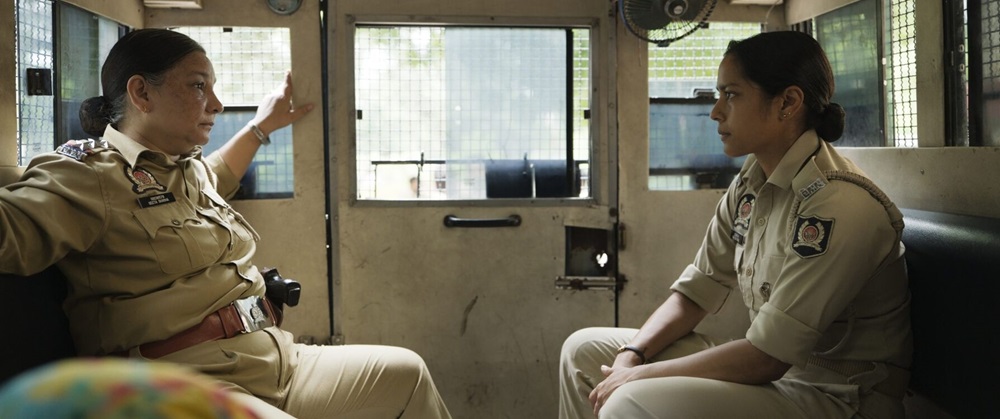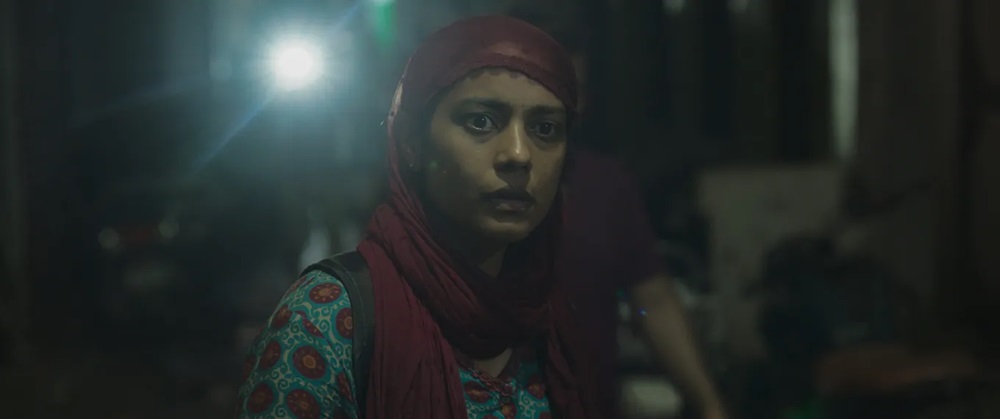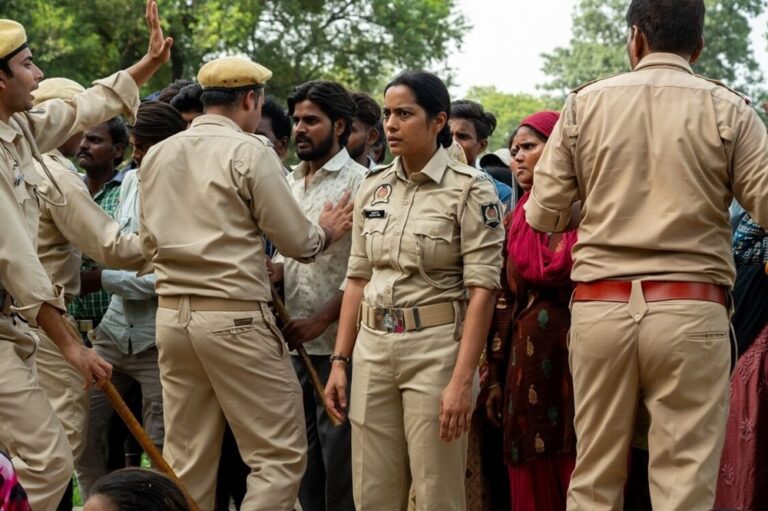With “Santosh,” Suri presents a deeply localized story that resonates universally, peeling back layers of caste, gender, and power. The film immerses us in a world where survival often comes at the cost of morality and where justice depends more on who you are than what you’ve done. But rather than presenting us with easy answers, Suri pushes us to sit with the discomfort—the unspoken hierarchies, the systemic failures, and the compromises required just to make it through. At its heart, “Santosh” isn’t about redemption or rebellion. It is a slow-burn examination of survival, told through the eyes of a woman navigating her way through grief, prejudice, and a system determined to crush her ideals. This is no hero’s journey, but that’s precisely what makes it so powerful.
More QCinema Coverage: ‘Lost Sabungeros’: A Chilling Portrait of Disappearances and Impunity in the Philippines
The Weight of Circumstance
Set in rural Northern India, the film opens with a woman—Santosh (Shahana Goswami in a nuanced yet stirring performance)—running aimlessly through the darkened streets, her grief raw and disorienting. We soon learn that her husband, Raman, a constable, has been killed during a riot. In a single stroke, Santosh’s world turns upside down. A young marriage suddenly ends, she risks losing the house as part of Raman’s job benefits, and she finds herself at the mercy of a system that sees her as expendable.
During a conversation with her husband’s superior, Santosh discovers that her only option is to accept the “Compassionate Appointment,” a government program that allows widows to take over their spouse’s jobs. Her reluctant acceptance of the role, driven not by ambition but by necessity, makes Santosh an intriguing protagonist; far removed from the usual archetypes of crusading or rebellious figures often seen in feminist cinema.
Santosh’s first day on the job sets the tone for what’s to come. She watches silently as a young girl accuses a boy of wrongdoing, with the latter beaten by officers despite a lack of substantive evidence. Goswami’s portrayal of Santosh in these early moments is particularly striking; her silence feels heavy with judgment and hesitation, her gaze conveying the moral quandaries she’s only beginning to understand.

An Idealist in the Gray Morass
Santosh’s initial idealism recalls other cinematic figures who enter systems with faith in their integrity, only to discover just how broken they truly are. Like the films mentioned at the onset, “Santosh” reveals a world where right and wrong rarely exist in absolutes. Instead, the justice system operates in shades of gray, shaped as much by caste, religion, and gender as by evidence or law.
The case of a murdered Dalit girl becomes a turning point in the narrative, exposing the deep-seated apathy within the police force. Officers dismiss the father’s pleas for help, meeting the girl’s death with indifference rather than outrage. It is Santosh’s initial resolve to investigate that keeps the case alive, though her pursuit of justice is fraught with challenges and compromises.
Using that case, Suri makes a broader critique of systemic violence and societal hierarchies. The girl’s caste (she is Dalit, part of India’s “untouchable” community) determines the police’s lack of urgency. The police, on the other hand, treat her illiterate and visibly destitute father with contempt as he tries to file a missing-persons report. The case would have languished, ignored like so many others, if not for Santosh’s naive enthusiasm.
Yet, Santosh’s efforts aren’t born of moral heroism. Her desire to pursue the case stems from a need to assert herself in an environment that views her as little more than a placeholder for her husband. This duality—her personal ambition interwoven with flashes of genuine idealism—makes her a deeply human and fallible character.
Mentorship and Moral Compromise
Santosh’s fragile resolve is tested further with the arrival of Inspector Geeta Sharma (Sunita Rajwar, magnificent as a mentor hardened by experience), a seasoned detective with a reputation for solving crimes against women. Sharma’s approach is pragmatic, sometimes brutal, and her methods are a stark contrast to Santosh’s cautious idealism. Rajwar’s performance is a revelation, her character exuding both charisma and a quiet menace. She becomes a mentor figure to Santosh, but her lessons often come at a moral cost.
The dynamic between Sharma and Santosh serves as one of the film’s richest threads. Sharma schools Santosh in the harsh realities of policing in a patriarchal, casteist system, where following the rules often leads to failure. Her methods, while effective, raise ethical questions. Sharma is willing to bend, even break, the rules to protect women like the murdered Dalit girl — but at what cost?
“There are two kinds of untouchables in this country,” Sharma tells Santosh in one of the film’s rare explicit lines. “Those who no one wants to touch, and those who can’t be touched.” This statement encapsulates the double-edged nature of power in “Santosh.” While Sharma wields her authority to challenge societal prejudices, she also upholds the same corrupt structures that perpetuate them.
Santosh, meanwhile, finds herself grappling with the implications of this mentorship. When the investigation leads to a Muslim suspect, the film forces her to confront her own biases. It was a communal riot in a Muslim neighborhood that resulted in her husband’s death, and the unresolved trauma clouds her judgment. The film doesn’t let her off the hook, presenting her growing aggression and entitlement as a chilling reflection of the system’s ability to corrupt even someone willing to uphold their morality.

Violence Against Women: A Broader Context
While “Santosh” is deeply personal, it also resonates within the larger context of violence against women in India. The murdered Dalit girl isn’t just a victim of caste-based prejudice; she also represents the countless women whose stories are silenced by systemic apathy.
Sharma’s philosophy, that one must sometimes get one’s hands dirty to save lives, is both a critique and a bitter acknowledgment of the status quo. The film doesn’t glamorize her methods, but it does ask difficult questions about what justice requires in a world that offers none. This interplay between the personal and the systemic is where “Santosh” shines. It refuses to offer easy answers or convenient resolutions. There are no heroes here, not even Santosh herself. But in a world devoid of clear morality, the film finds power in small acts of defiance, in the stubborn refusal to accept injustice.
Suri’s direction grounds “Santosh” in a gritty realism that feels uncomfortably authentic. The world of the film is unrelenting, from the claustrophobic confines of the police station to the unadorned landscapes of rural India. The use of non-actors in many supporting roles enhances this realism, creating a world that feels lived-in and painfully real.
The film’s restraint, however, might alienate some viewers. Its refusal to delve deeper into certain subplots—such as the deeper implications of anti-Muslim sentiment—can feel like missed opportunities. Additionally, its subdued tone and slow pacing might make it feel emotionally distant at times.
More QCinema Coverage: ‘All We Imagine as Light’ Meditating on the Persistence—Despite the Impermanence—of ‘Home’
‘Santosh’: A World Without Heroes, But Full of Humanity
Despite these minor shortcomings, Santosh offers a deeply human story. Its greatest strength lies in its moral ambiguity, in its willingness to portray characters as flawed, complex individuals navigating impossible circumstances. Santosh isn’t a hero, but she is trying. And in a world like this, sometimes that’s all one can do.
This lack of heroism, for me, is what makes “Santosh” so compelling. The film doesn’t seek to inspire or console. Instead, it confronts us with the messy, uncomfortable truth of a broken system. Its imperfections reflect the complexity of the world it portrays, a world where justice is conditional and survival requires compromise.
Anchored by Shahana Goswami’s powerful performance and Sandhya Suri’s assured direction, the film is a slow-burn examination of power, prejudice, and moral compromise that forces you to confront the questions yourself—about justice, about morality, and about what it means to do the right thing when the system itself is wrong.
In that discomfort, Santosh finds its quiet power. And in this case, isn’t it more than enough?
An international co-production between France, Germany, and the United Kingdom, “Santosh” was selected as the UK’s entry for Best International Feature Film at the 97th Academy Awards. The film screened in this year’s QCinema International Film Festival under its New Horizons section. The festival runs from November 8 to 17, 2024. Follow us for more coverage.



